外研版(2019)必修 第三册Unit 1 Knowing me, Knowing you speaking and listening课件(共34张PPT 内嵌音频)
文档属性
| 名称 | 外研版(2019)必修 第三册Unit 1 Knowing me, Knowing you speaking and listening课件(共34张PPT 内嵌音频) | 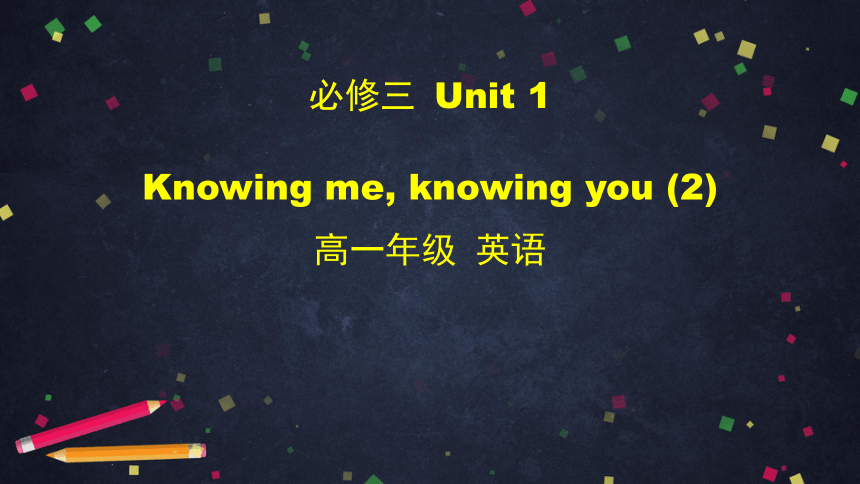 | |
| 格式 | pptx | ||
| 文件大小 | 14.7MB | ||
| 资源类型 | 教案 | ||
| 版本资源 | 外研版(2019) | ||
| 科目 | 英语 | ||
| 更新时间 | 2023-09-08 17:31:48 | ||
图片预览

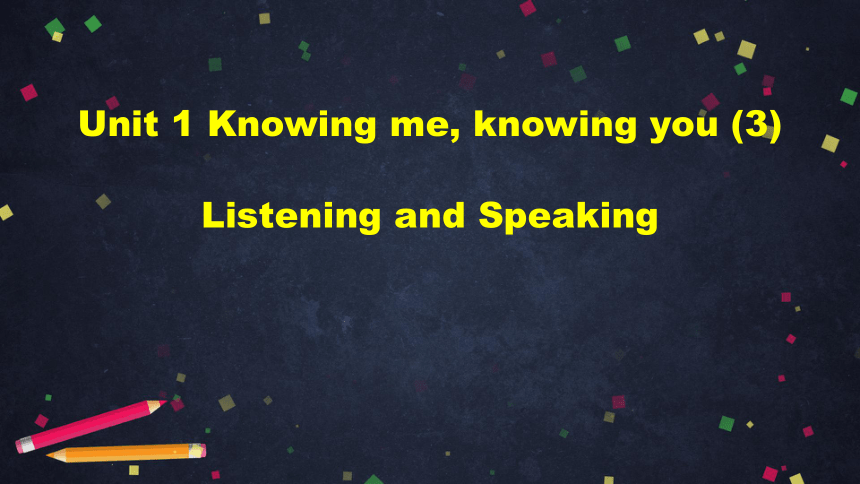
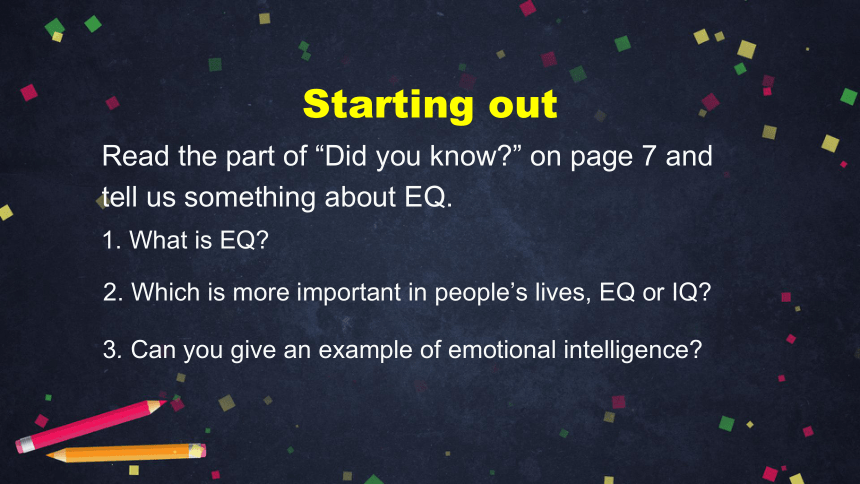
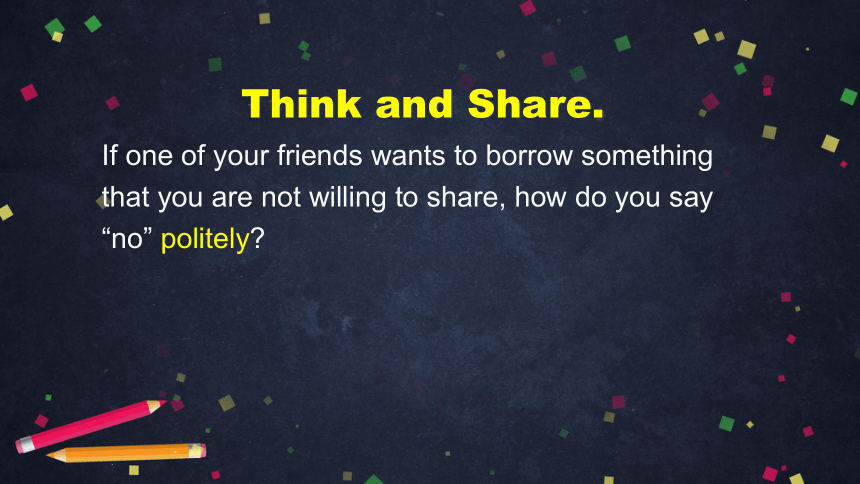
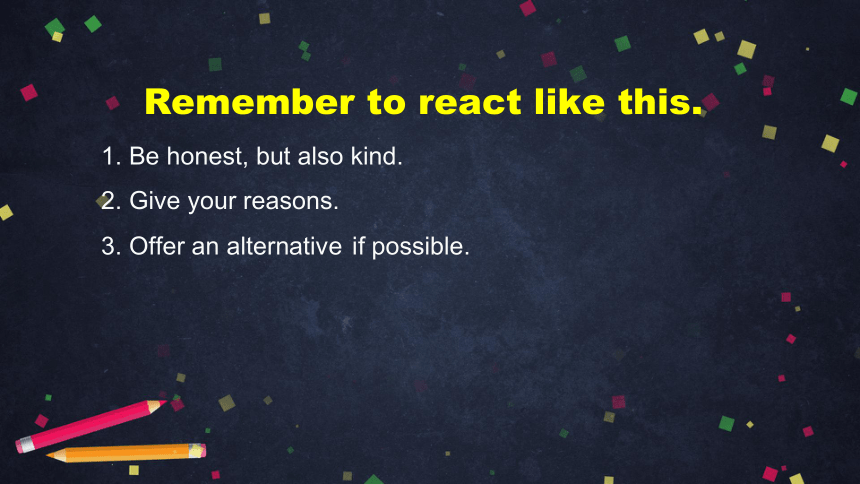
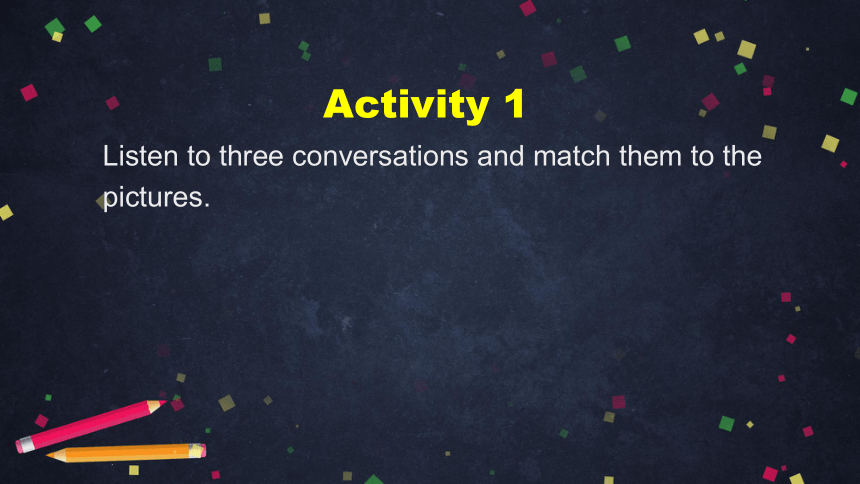
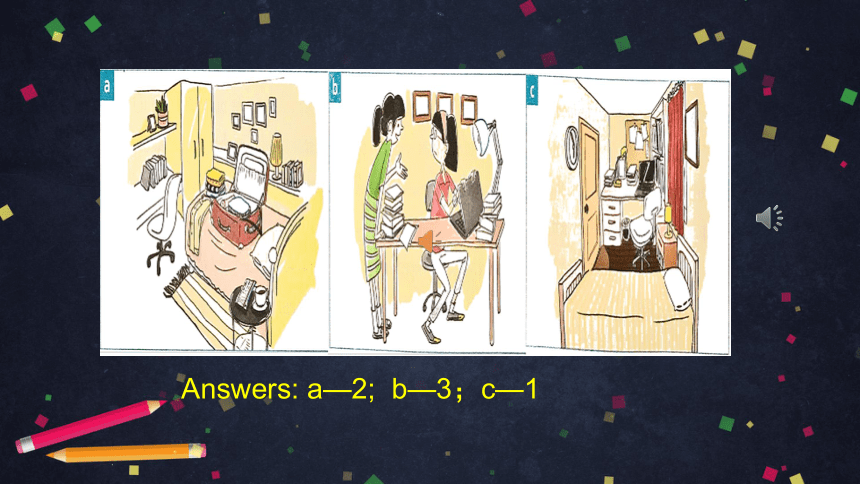
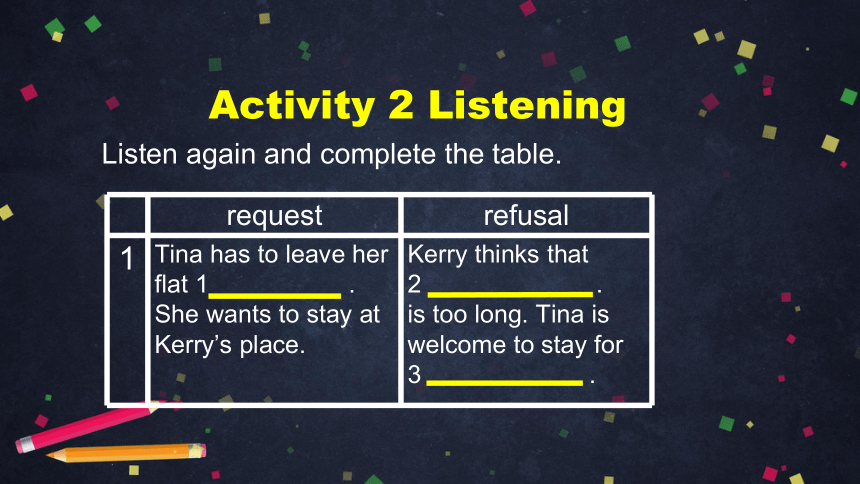
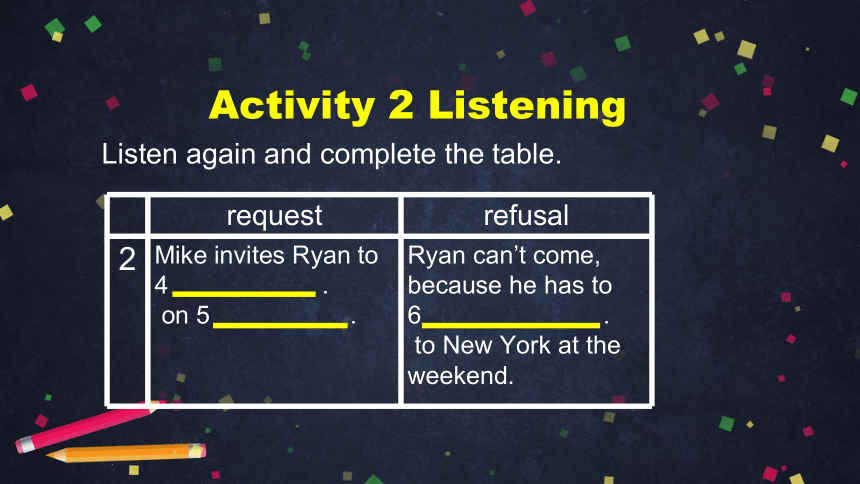
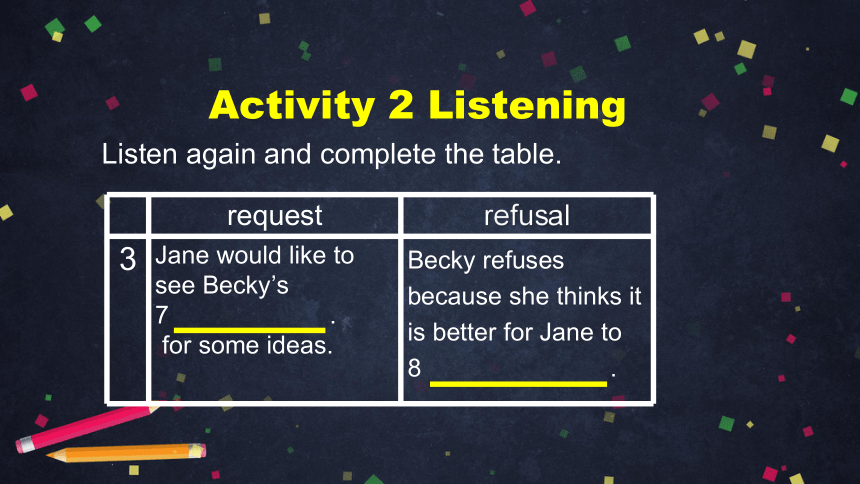
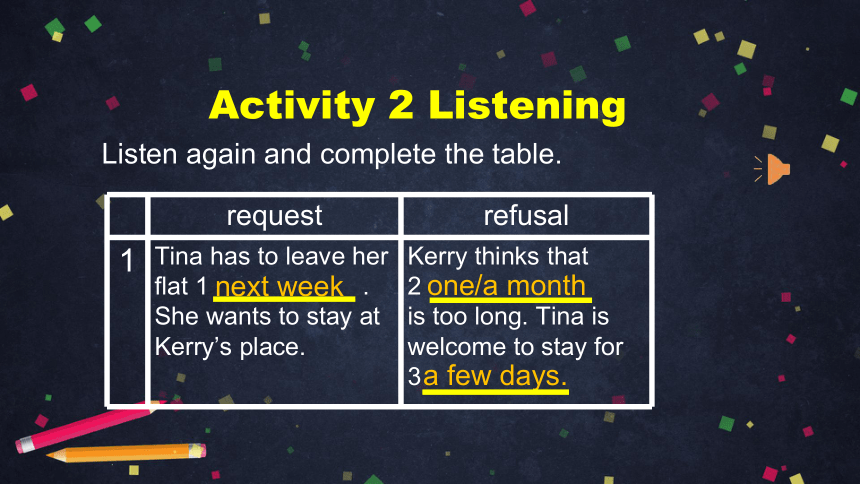
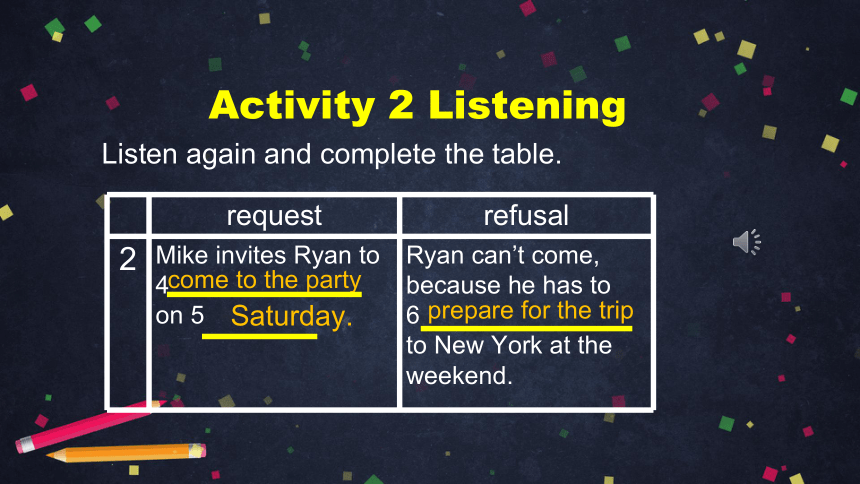
文档简介
(共34张PPT)
必修三 Unit 1
Knowing me, knowing you (2)
高一年级 英语
Unit 1 Knowing me, knowing you (3)
Listening and Speaking
Starting out
Read the part of “Did you know ” on page 7 and
tell us something about EQ.
1. What is EQ
2. Which is more important in people’s lives, EQ or IQ
3. Can you give an example of emotional intelligence
Think and Share.
If one of your friends wants to borrow something that you are not willing to share, how do you say “no” politely
Remember to react like this.
3. Offer an alternative if possible.
1. Be honest, but also kind.
2. Give your reasons.
Listen to three conversations and match them to the pictures.
Activity 1
Answers: a—2; b—3;c—1
Listen again and complete the table.
Activity 2 Listening
request refusal
1 Tina has to leave her flat 1 . She wants to stay at Kerry’s place. Kerry thinks that
2 .
is too long. Tina is welcome to stay for
3 .
.
request refusal
2 Mike invites Ryan to 4 . on 5 . Ryan can’t come, because he has to
6 .
to New York at the weekend.
Listen again and complete the table.
Activity 2 Listening
request refusal
3 Jane would like to see Becky’s 7 . for some ideas. Becky refuses because she thinks it is better for Jane to
8 .
Listen again and complete the table.
Activity 2 Listening
request refusal
1 Tina has to leave her flat 1 . She wants to stay at Kerry’s place. Kerry thinks that
2
is too long. Tina is welcome to stay for
3
next week
one/a month
a few days.
Listen again and complete the table.
Activity 2 Listening
request refusal
2 Mike invites Ryan to 4 on 5 Ryan can’t come, because he has to
6
to New York at the weekend.
come to the party
Saturday.
prepare for the trip
Listen again and complete the table.
Activity 2 Listening
request refusal
3 Jane would like to see Becky’s 7 for some ideas. Becky refuses because she thinks it is better for Jane to
8
project
do her project
by herself.
Listen again and complete the table.
Activity 2 Listening
Now talk about how the speakers make requests and refusals. Listen again and read the conversations aloud, paying attention to the expressions of request and refusal.
Activity 3 Talking
Tina: Hi Kerry, have you got a minute
Kerry: Yeah, sure, Tina. What’s up
Tina: Well, the thing is, ... Could I …
Kerry: You mean …
Tina: Er… not exactly …
Kerry: … I’m afraid …
Tina: Oh, come on, please…
Kerry: I’m sorry, but …
Mike: Hello Ryan! Just the person I wanted to see!
Ryan: Hi Mike. How’s it going
Mike: … You’ll come, won’t you
Ryan: … I’d love to, but …
Mike: That’s too bad. I’m sorry you’ll miss it.
Ryan: Yes, I’m sorry, too. Next time, OK
Jane: Becky, have you done your project yet
Becky: Hi Jane. You mean …
Jane: Yes, that’s the one.
Becky: …
Jane: … The thing is, …, I was just wondering if you could…
Becky: I’m not sure… It would be better to …
Jane: I promise …
Becky: I’m sorry, Jane, it just doesn’t feel right…
If you have to say no to a request, your refusal will sound more polite if you begin with a statement of regret, such as I’m sorry…, I’d really like to, but… Then explain why your answer is no, e.g. I’m really busy right now. If possible, suggest an alternative —How about next week
Learning to learn
Work in pairs. Act out the conversation about asking for a favour and refusing politely.
Activity 4 Speaking
Student A: Turn to Page 81.
You will go on a trip with your family for two weeks and you would like to ask Student B to take care of your pet cat. Explain to him / her.
You’d like to send your pet cat to his / her flat to stay for 2 weeks.
Your cat is well-behaved and won’t make any trouble.
You will treat your classmate to dinner when you come back.
1. Have you got a minute
2. Hello…! Just the person I wanted to see.
3. Well, the thing is…
4. I was just wondering if you could…
5. I promise…
6. Oh, come on, please…
Useful expressions for student A
Student A would like you to do him / her a favour.
You have to refuse politely. Explain to him / her.
You don’t want your room to be messy.
Your parents won’t allow it.
You know another classmate who likes cats and maybe he / she would like to help.
Student B: Turn to Page 84.
1. What’s up
2. Oh, you mean…
3. I’m afraid…
4. I’m sorry, but…
5. I think it would be better to…
6. But maybe…
Useful expressions
A: Hello, Jenny! Have you got a minute
B: Yeah, sure, Tina. What’s up
A: Well, the thing is, I’m going on a trip with my parents and will be gone for two weeks. I was just wondering if you could keep my pet cat in your flat.
B: I’m sorry, but I don’t want my room to be messy. Besides, my parents won’t allow it.
An example:
A: Oh, come on, please. My cat is well-behaved and won’t make any trouble. I promise I will treat you to dinner when I come back.
B: I know Kevin likes cats and maybe he would like to keep it.
A: Oh, that would be great!
B: His house is not far from here, and I will go with you to see him.
A: That sounds wonderful. Let’s go, shall we
An example:
Evaluation 1
standard details good average poor
performance proper facial expressions and gestures
language proper use of functional sentences
pronunciation & intonation correctness, clarity
Saying no if the request is not morally right.
Saying no if the request is going too far.
Saying no if you don’t have the time to meet a commitment.
Work in pairs. Think of another situation and have a similar conversation.
Activity 5
Mike: Hello Ryan! Just the person I wanted to see!
Ryan: Hi Mike. How’s it going
Mike: I’m having a trouble now. I went to play football several minutes before the self-study class was over. Can you tell our class teacher that I was called to the student union for an interview at that time
Another example:
Ryan: Sorry, Mike. I don’t want to tell a lie. That will cause more trouble. It would be better for you to tell her the truth and ask for her forgiveness.
Mike: I am afraid she will be very angry and punish me severely.
Ryan: Honesty is the best policy. If you apologize for your fault sincerely, our class teacher will forgive you, I promise.
Another example:
Mike: Could you go to her office with me I feel a bit afraid.
Ryan: Sure, I will accompany you to her office door. And I believe you can come out alive and light-heartedly.
Mike: I hope so. Thanks, anyway.
Another example:
standard details good average poor
performance proper facial expressions and gestures
content reflection of the real situation in life
language proper use of functional sentences
pronunciation & intonation correctness, clarity
Evaluation 2
Summary:
Techniques to say NO
Excuse yourself plainly.
Make a counter-offer.
Suggest a retry later.
Use humility.
2. Act out the dialogue on page 81 and 84.
Homework
1.Sort out notes of EQ. and summarize the key points of polite refusal.
3. Make a similar conversation based on your real life experience.
Thanks for watching!
高一年级 英语
必修三 Unit 1
Knowing me, knowing you (2)
高一年级 英语
Unit 1 Knowing me, knowing you (3)
Listening and Speaking
Starting out
Read the part of “Did you know ” on page 7 and
tell us something about EQ.
1. What is EQ
2. Which is more important in people’s lives, EQ or IQ
3. Can you give an example of emotional intelligence
Think and Share.
If one of your friends wants to borrow something that you are not willing to share, how do you say “no” politely
Remember to react like this.
3. Offer an alternative if possible.
1. Be honest, but also kind.
2. Give your reasons.
Listen to three conversations and match them to the pictures.
Activity 1
Answers: a—2; b—3;c—1
Listen again and complete the table.
Activity 2 Listening
request refusal
1 Tina has to leave her flat 1 . She wants to stay at Kerry’s place. Kerry thinks that
2 .
is too long. Tina is welcome to stay for
3 .
.
request refusal
2 Mike invites Ryan to 4 . on 5 . Ryan can’t come, because he has to
6 .
to New York at the weekend.
Listen again and complete the table.
Activity 2 Listening
request refusal
3 Jane would like to see Becky’s 7 . for some ideas. Becky refuses because she thinks it is better for Jane to
8 .
Listen again and complete the table.
Activity 2 Listening
request refusal
1 Tina has to leave her flat 1 . She wants to stay at Kerry’s place. Kerry thinks that
2
is too long. Tina is welcome to stay for
3
next week
one/a month
a few days.
Listen again and complete the table.
Activity 2 Listening
request refusal
2 Mike invites Ryan to 4 on 5 Ryan can’t come, because he has to
6
to New York at the weekend.
come to the party
Saturday.
prepare for the trip
Listen again and complete the table.
Activity 2 Listening
request refusal
3 Jane would like to see Becky’s 7 for some ideas. Becky refuses because she thinks it is better for Jane to
8
project
do her project
by herself.
Listen again and complete the table.
Activity 2 Listening
Now talk about how the speakers make requests and refusals. Listen again and read the conversations aloud, paying attention to the expressions of request and refusal.
Activity 3 Talking
Tina: Hi Kerry, have you got a minute
Kerry: Yeah, sure, Tina. What’s up
Tina: Well, the thing is, ... Could I …
Kerry: You mean …
Tina: Er… not exactly …
Kerry: … I’m afraid …
Tina: Oh, come on, please…
Kerry: I’m sorry, but …
Mike: Hello Ryan! Just the person I wanted to see!
Ryan: Hi Mike. How’s it going
Mike: … You’ll come, won’t you
Ryan: … I’d love to, but …
Mike: That’s too bad. I’m sorry you’ll miss it.
Ryan: Yes, I’m sorry, too. Next time, OK
Jane: Becky, have you done your project yet
Becky: Hi Jane. You mean …
Jane: Yes, that’s the one.
Becky: …
Jane: … The thing is, …, I was just wondering if you could…
Becky: I’m not sure… It would be better to …
Jane: I promise …
Becky: I’m sorry, Jane, it just doesn’t feel right…
If you have to say no to a request, your refusal will sound more polite if you begin with a statement of regret, such as I’m sorry…, I’d really like to, but… Then explain why your answer is no, e.g. I’m really busy right now. If possible, suggest an alternative —How about next week
Learning to learn
Work in pairs. Act out the conversation about asking for a favour and refusing politely.
Activity 4 Speaking
Student A: Turn to Page 81.
You will go on a trip with your family for two weeks and you would like to ask Student B to take care of your pet cat. Explain to him / her.
You’d like to send your pet cat to his / her flat to stay for 2 weeks.
Your cat is well-behaved and won’t make any trouble.
You will treat your classmate to dinner when you come back.
1. Have you got a minute
2. Hello…! Just the person I wanted to see.
3. Well, the thing is…
4. I was just wondering if you could…
5. I promise…
6. Oh, come on, please…
Useful expressions for student A
Student A would like you to do him / her a favour.
You have to refuse politely. Explain to him / her.
You don’t want your room to be messy.
Your parents won’t allow it.
You know another classmate who likes cats and maybe he / she would like to help.
Student B: Turn to Page 84.
1. What’s up
2. Oh, you mean…
3. I’m afraid…
4. I’m sorry, but…
5. I think it would be better to…
6. But maybe…
Useful expressions
A: Hello, Jenny! Have you got a minute
B: Yeah, sure, Tina. What’s up
A: Well, the thing is, I’m going on a trip with my parents and will be gone for two weeks. I was just wondering if you could keep my pet cat in your flat.
B: I’m sorry, but I don’t want my room to be messy. Besides, my parents won’t allow it.
An example:
A: Oh, come on, please. My cat is well-behaved and won’t make any trouble. I promise I will treat you to dinner when I come back.
B: I know Kevin likes cats and maybe he would like to keep it.
A: Oh, that would be great!
B: His house is not far from here, and I will go with you to see him.
A: That sounds wonderful. Let’s go, shall we
An example:
Evaluation 1
standard details good average poor
performance proper facial expressions and gestures
language proper use of functional sentences
pronunciation & intonation correctness, clarity
Saying no if the request is not morally right.
Saying no if the request is going too far.
Saying no if you don’t have the time to meet a commitment.
Work in pairs. Think of another situation and have a similar conversation.
Activity 5
Mike: Hello Ryan! Just the person I wanted to see!
Ryan: Hi Mike. How’s it going
Mike: I’m having a trouble now. I went to play football several minutes before the self-study class was over. Can you tell our class teacher that I was called to the student union for an interview at that time
Another example:
Ryan: Sorry, Mike. I don’t want to tell a lie. That will cause more trouble. It would be better for you to tell her the truth and ask for her forgiveness.
Mike: I am afraid she will be very angry and punish me severely.
Ryan: Honesty is the best policy. If you apologize for your fault sincerely, our class teacher will forgive you, I promise.
Another example:
Mike: Could you go to her office with me I feel a bit afraid.
Ryan: Sure, I will accompany you to her office door. And I believe you can come out alive and light-heartedly.
Mike: I hope so. Thanks, anyway.
Another example:
standard details good average poor
performance proper facial expressions and gestures
content reflection of the real situation in life
language proper use of functional sentences
pronunciation & intonation correctness, clarity
Evaluation 2
Summary:
Techniques to say NO
Excuse yourself plainly.
Make a counter-offer.
Suggest a retry later.
Use humility.
2. Act out the dialogue on page 81 and 84.
Homework
1.Sort out notes of EQ. and summarize the key points of polite refusal.
3. Make a similar conversation based on your real life experience.
Thanks for watching!
高一年级 英语
